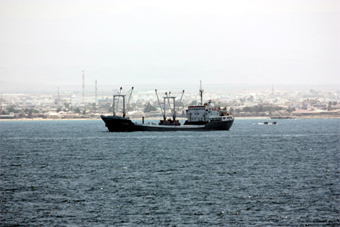|
Iran
Israel’s Naval Bases, Somaliland’s Recognition: Port Berbera—Bargaining
Chip
(Barbara,
Feb 26, 2010 Ceegaag Online)

A Somali warrior poet once
said, "Rag hadaad colaad leedihiin, ciidanse uwaydo,
waxkastood ku ciil bixi kartaa kuu cawo aduune...or if you
are embroiled in a hostile war with other men but don't have
a counter attack force, anything that could alleviate your
pain serves as luck on your side."
Taking the advice of the poet, if Somaliland cannot escape
from its isolation and mobilize the resources needed to
break through the formidable concrete walls encompassing it,
engaging with any nation that could alleviate Somaliland’s
ordeal is a fair game: be it Israel or Iran, or an alien
republic in Mars.
Form 1991 to present, Somaliland remains an independent but
unrecognized state, alienated by none other than the Arabs
who Somalilanders consider brothers and sisters. Worse
still, as if alienation and economic holocaust towards
Somaliland could not deliver the final blow, among others,
Somaliland remains in the midst of a turbulence sea, yet no
end to its miseries. To top it up, never before has
Somaliland faced relentless terrorist attacks from none
other than Southern Somalia’s extremist groups, namely: Al-Shabaab.
See terrorist attacks details:
http://www.americanchronicle.com/articles/view/137149
Now, despite building an impressive democratic system (a
dream in many parts of Africa; unthinkable in the Arab
world), despite establishing a peaceful state, and despite
combating piracy, terrorism, and human trafficking in Horn
of Africa, Somaliland is awarded with sanctions including
livestock ban, using its passport, and barring its leaders
from attending Arab, African, as well as International
conferences.
Traditionally, chocking the lifeline of a country is
something reserved for a rogue regime which supports
terrorisms and bent to spur mayhem in the International
community. But ironically, self-destructive autocratic
regimes receive better treatments than the democratic state
of Somaliland does. Why?
Much of the hostilities and isolations towards Somaliland
stems from its refusal to budge on Arab demands. That is,
coercing Somaliland to accept another gunshot marriage with
Somalia. Now, the Arab world instead of first providing
Somaliland an economic incentive to mediate Somalia’s
warring factions, and then convincing Somaliland to have a
dialogue with Somalia, Arab rulers opted to suffocate
Somaliland first, then rebuild Somalia. Without a doubt, at
times, as its mouth fell open, Somaliland desperately
grasped for a breath of air but because of its determination
it remains defiant.
However, recently the Arab rulers´ attitude towards
Somaliland has softened up; for instance the livestock ban
has been lifted. Now, the rulers changed their hearts not
because they finally have mercy for Somaliland but because
of other factors: for one thing, Somalia remains drowned in
a sea of blood and its Oceans infested with pirates. Also,
its leaders have gone from tribal warlords to religious
warmongers. They just changed shirts. Surprise!
For another, two of the most powerful countries in the
Middle East: Israel and Iran are now flexing their muscles
over East Africa, specifically, Somaliland’s strategic port
Berbera. They both want to use the port as a naval base. But
the problem is Arab leaders perceive Iran and Israel as
archenemies of Arab states, a threat to the Middle East
monarchies. Now for the Arab states to have either of their
natural adversaries in port Berbera, which has strategic
importance, is unthinkable.
During the cold war, port Berbera served as a naval base for
the Soviet forces first and later for the U.S. marines. The
city also has one of the longest runways in Africa; that is,
in the event of emergency landing, the Space Shuttle
Discovery could descend on the city’s airport. But more
important, its airport could be used as the springboard for
a military operation to stamp out terrorism in East Africa
and piracy in the Golf of Aden.
But for the Iranians and Israelis, their mission has little
to do with curbing terrorism or eradicating piracy and has
more to do with: out competing against each other as well as
edging out the Arab countries.
Now, the U.S. which has its forces in Djibouti will
resolutely oppose establishing an Iranian naval base in
Berbera. But the U.S. may not necessarily oppose Israelis.
Arab rulers, on the other hand, consider both Iran and
Israel’s presence in Berbera as undesirable.
Meanwhile, port Berbera is evidently the bargaining chip for
Somaliland to achieve its goal. Currently, Somalilanders
couldn´t care less whether it is Iranians or Israelis, or
aliens from Mars that establish a naval base in port Berbera
as long as they recognize Somaliland. Will Iran and Israel’s
competition for East Africa trigger Somaliland’s
recognition?
Depending who offers the bigger economic and military
incentives, both Israel and Iran are welcomed in Somaliland.
Doubtlessly, if executed properly, Somaliland has two Ace
cards to play with.
Arabs and Iran: if Israelis gains the competitive edge, Arab
countries and Iran need to wake up and smell the coffee.
They should iron out their differences with Somaliland to
avert an Israel influence in East Africa.
U.S., Israel, and Arab countries: if, however, Iran puts all
its eggs in one basket as to win the hearts and minds of
Somaliland people which could be achieved easily since
Somalilanders view Iran as a Muslim nation, U.S., Israel,
and Arab countries will have no choice but give Somaliland
what it wants so that Iran doesn’t base its naval forces in
port Berbera. U.S. should offer huge economic incentives to
Somaliland while Arabs end isolating it economically and
politically. This is not too much to ask, is it?
Ultimately, no matter how the dice is rolled, one thing is
clear: Somaliland will look after its interest. Be it with
Iran or Israel, Somaliland is open for business—first come,
first served.
Dalmar Kaahin

webmaster@ceegaag.com |

